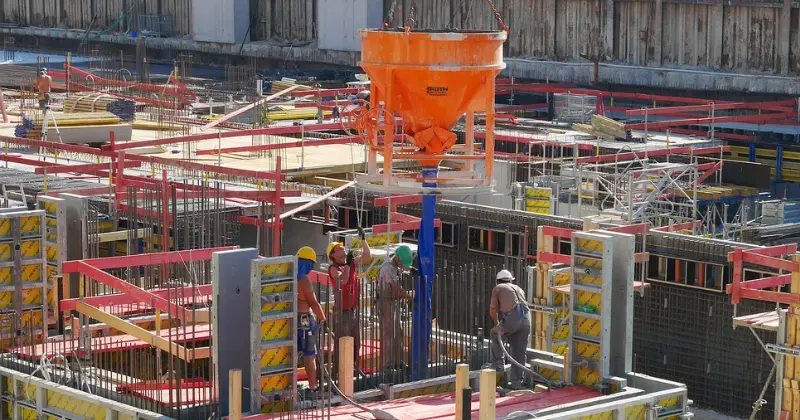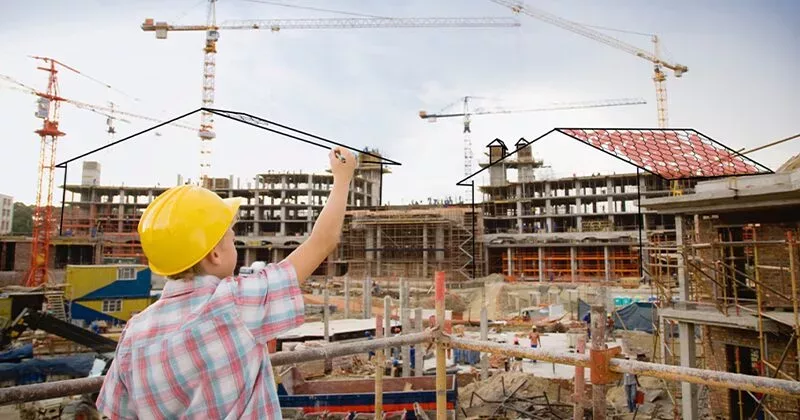11 mins read
What is a Construction Procurement Manager? Understanding The Ins and Outs of This Role

- What is a Construction Procurement Manager?
- What Does a Construction Procurement Manager Do? Key Responsibilities
- Key Construction Procurement Manager Skills
- How Much Can You Earn as a Construction Procurement Manager?
- How to Become a Procurement Manager?
- What Challenges Do Construction Procurement Managers Face?
- What Kind of Software Do Construction Procurement Managers Use?
- Final Thoughts
Over the last few weeks, we have been putting together a series of blog posts that aim to educate people about the different technologies, processes, and people in the construction industry. Among others, we explored the roles of the construction planner, the construction specifier, and the BIM manager. Today, we delve into the role of the construction procurement manager.
Procurement management in construction is an essential part of a project, accounting for up to 70% of a company’s total spending. The role of the construction procurement manager can therefore not be underestimated. They are not only responsible for finding the most cost-effective materials for each project but also need to be skilled in juggling all the different aspects of the project and facing daily challenges head-on.
Keep reading to find out more about the construction procurement manager role.
What is a Construction Procurement Manager?
A procurement manager in the construction industry is a supply chain and logistics professional who is responsible for purchasing all the necessary materials for construction projects, ensuring they are both cost-effective and suitable for the job.
Construction procurement managers must also ensure that the materials reach the site on time. In addition, the materials need to be within the client’s specified budget. Because prices can fluctuate without warning, this part of a construction procurement manager’s job is often a difficult one.
It doesn’t stop there, though: These professionals must ensure that the materials meet the acceptable quality regulations and need to always have enough materials in stock. Negotiating with suppliers and vendors for better prices, service, and delivery deals is also a key part of their job.
What Does a Construction Procurement Manager Do? Key Responsibilities
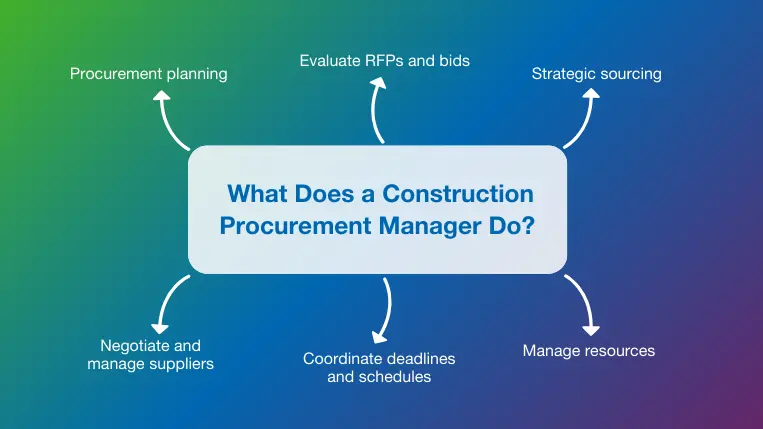
Procurement planning
Construction procurement managers need to identify the procurement needs of the client and develop and implement procurement policies. They manage direct and indirect procurement processes, including purchasing goods, services, and raw materials needed for the daily operation of the project.
Evaluate RFPs and bids
They also play a key part in the construction bidding process. They send out the request for proposal (RFQ) and evaluate the material vendors who are bidding on the job to find the best-suited one.
Strategic sourcing
Strategic sourcing is a complex and methodical approach to procurement that aims to continuously re-evaluate and improve the purchasing activities of the entire organization. Here, the construction procurement manager identifies strategic sourcing opportunities, researches and identifies potential suppliers, and analyzes the suppliers’ proposals.
Thereafter, they select the supplier best suited for the job, negotiate and execute the contract, and finally, regularly assess how well the suppliers are meeting their contractual obligations in terms of performance, quality, delivery, cost, and service.
Manage resources
Managing materials, equipment, and services required for a construction project is an important aspect of a procurement manager’s job. They determine the unique requirements for each stage of the project and make sure that enough high-quality resources are on hand when needed. This involves careful planning and forecasting to avoid overstocking or material shortages, which could delay the project or inflate costs.
Coordinate deadlines and schedules
In addition to managing resources, procurement managers oversee the whole supply chain, making sure that all goods and equipment are delivered on time by organizing schedules and deadlines. They coordinate the construction schedule with the delivery timeline to guarantee timely delivery of resources and avoid any delays. This requires constant communication with suppliers, transportation services, and internal teams to track orders and monitor deliveries.
Negotiate and manage suppliers
The procurement manager builds and maintains strong relationships with suppliers, negotiating favorable terms for cost, quality, and delivery schedules. To pull this off, they need a head for numbers when it comes to supply chain risks and fluctuating material prices. Their ability to handle contracts is crucial, as is their ability to make sure that all agreements are transparent and legally binding and safeguard the business from issues like unexpected price hikes or delivery delays.
Key Construction Procurement Manager Skills
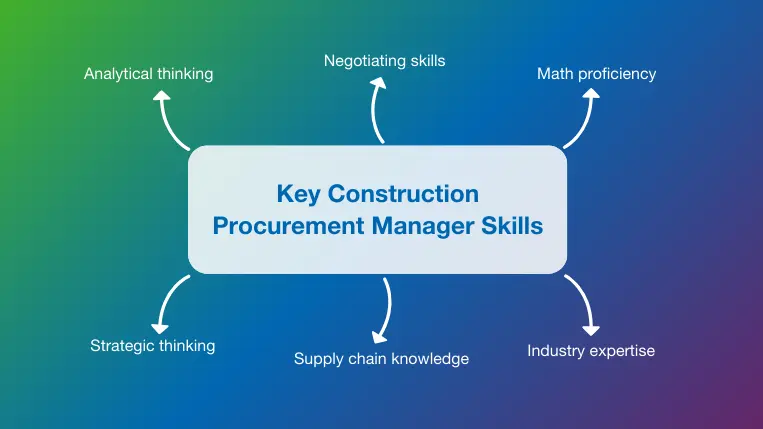
Acquiring materials, equipment, and services for construction projects is a complicated and high stakes undertaking that requires a diverse set of skills from a construction procurement manager. Below are key skills that are essential for success in this role:
- Analytical Thinking: They must be skilled in analytical thinking to assess and interpret data related to costs, inventory, supplier performance, and market trends. The best procurement managers improve buying strategies by assessing project needs and material forecasts and applying solid construction risk management tactics. This helps to eliminate budget overruns and bottlenecks.
- Negotiation Skills: Strong negotiation skills are essential for procurement managers to secure favorable contracts with suppliers. They should be able to safeguard the company’s interests while finding the optimal balance between quality, cost, and delivery schedules.
- Math Proficiency: Due to their frequent interaction with financial data, construction budget management, and cost projections, these professionals must possess strong mathematical skills. They must precisely calculate the number of materials needed, analyze cost-benefit scenarios, and determine pricing strategies.
- Industry Expertise: Procurement managers must have in-depth industry expertise since they must understand the specific materials, equipment, and services required for construction projects. The success of the project depends on their experience with construction processes and standards. They also make sure that the materials they procure meet all quality and compliance criteria.
- Supply Chain Knowledge: For a procurement manager to effectively handle sourcing, purchasing, and delivery, they must have a firm grasp of supply chain management. Logistics coordination, supplier relationship management, and mitigating risks associated with delays, shortages, or disruptions are all part of this.
- Strategic Thinking: The construction procurement manager must consider not only immediate project needs but also future demands, market trends, and potential risks. Strategic thinkers can anticipate price fluctuations, identify emerging supplier opportunities, and develop strategies that provide competitive advantages.
How Much Can You Earn as a Construction Procurement Manager?
The average construction procurement manager salary in the United States is $147,058 per year. In the UK, a construction procurement manager can earn around £63,096 ($84,516) annually. As with all other professions, your salary can be affected by your skills, experience, the nature of the role, the level of responsibility, and your professional qualifications.
How to Become a Procurement Manager?
Most successful procurement managers hold at least a bachelor’s degree in a business, finance, or industry-related field. To really stand out, you can obtain a master’s degree in the procurement sector, which will show you are willing to go the extra mile. If you don’t want to pursue a degree, you can search and apply for Procurement Specialist/Agent internships or apprenticeships. This will help you get a feel for the company’s day-to-day schedule and expectations, although the salary will most probably be lower than that of an entry-level procurement job.
You can also obtain professional qualifications from the global Chartered Institute of Procurement and Supply (CIPS), which offers a range of pathways to becoming an official Member of the Chartered Institute of Procurement and Supply (MCIPS). Over 54% of employers worldwide request procurement managers to possess this professional designation, as it evidences knowledge and experience in the supply chain and procurement sector. If you live in the United Kingdom, you can earn a certificate or diploma from the Institute of Supply Chain Management (IoSCM).
What Challenges Do Construction Procurement Managers Face?
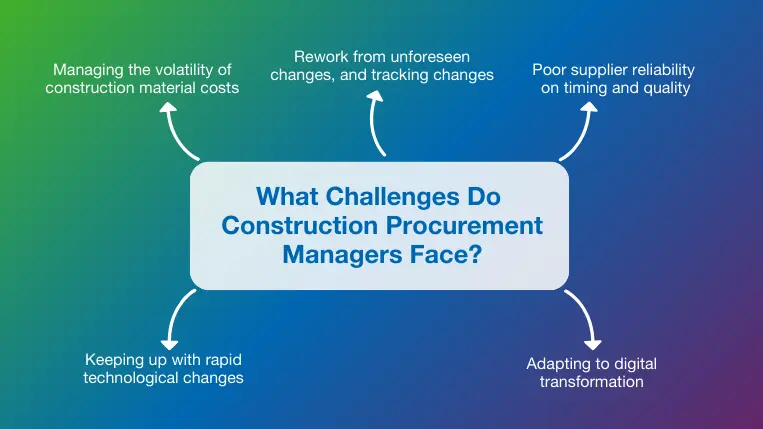
There are numerous challenges construction procurement managers stare in the eye that can significantly impact the success of a project. Below are some of the key challenges they encounter:
Managing the volatility of construction material costs
The ever-changing prices of construction materials are a significant issue for procurement managers. These prices are susceptible to disruptions in the global supply chain, fluctuations in the economy, and changes in consumer demand. Budgets and set costs for essential commodities like steel, timber, and concrete are notoriously difficult to predict because of their unexpected price movements.
Procurement managers must keep an eye on this by keeping tabs on market trends, negotiating price-lock agreements with suppliers, and looking into alternative materials as costs rise. The market’s volatility, however, may put pressure on project budgets even when these methods are in place.
Rework from unforeseen changes, and tracking changes
Problems that procurement managers often face include unexpected changes to the project’s scope, design, or schedule, which may cause expensive rework. The initial procurement strategy can be thrown into a loop if these modifications need alternative materials, quantities, or new supplier agreements.
To keep track of all these changes and make sure that supplies are bought, transported, and used properly, procurement managers must work closely with construction project managers, engineers, and suppliers – which may be a challenging process. Achieving successful change management requires thorough documentation, ongoing communication, and the agility to adjust procurement tactics on the fly without jeopardizing the project’s schedule or budget.
Poor supplier reliability on timing and quality
Inconsistent and unreliable material and delivery times from suppliers are another major challenge. Late deliveries can throw project schedules off course, causing delays in construction work and leading to expensive downtime for crews and equipment. Equally problematic are issues with safety, resource waste, and rework caused by materials that don’t match quality requirements. To mitigate these risks, procurement managers need to carefully vet suppliers, establish strong contracts with penalties for delays or subpar materials, and maintain backup options with alternative suppliers.
Adapting to digital transformation
Among the many difficulties encountered by procurement managers in the construction industry is the rise of digital transformation. Procurement managers must embrace and incorporate digital solutions into their processes as new software tools and technologies are being developed at a fast pace. Though e-procurement platforms, automated tracking tools, and cloud-based document management systems might boost productivity, adjusting to them usually requires restructuring processes and retraining teams.
The shift to digital procurement can also bring initial costs and resistance to change, especially in companies that have traditionally relied on manual or paper-based systems. Successfully using digital technologies is crucial for maintaining competitiveness and enhancing procurement efficiency over time.
Keeping up with rapid technological changes
One of the ongoing challenges for procurement managers is keeping up with the fast technology advancements, which are closely related to digital transformation. Advancements in construction technology – such as 5D BIM software, advanced data analytics, and artificial intelligence – are reshaping the way procurement is handled.
Procurement managers must stay updated on the latest technologies that can improve supplier selection, cost estimation in construction projects, and supply chain logistics. But time and energy are needed to learn new tools, incorporate them into current systems, and assess their effectiveness. Companies lose some of their competitive advantage when they lag in adopting these technologies.
What Kind of Software Do Construction Procurement Managers Use?
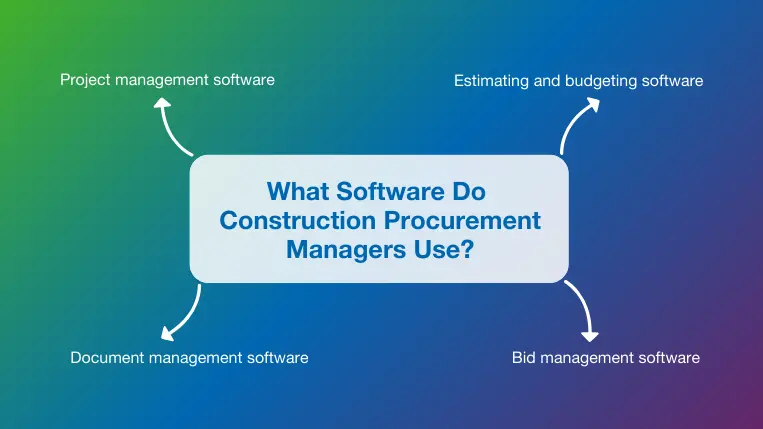
Procurement managers in the construction industry depend on a variety of specialized software to keep projects on track and under budget. Using these solutions, you can streamline operations, enhance communication in construction, and improve decision-making.
Project Management Software
Construction project management software assists procurement managers in keeping track of deadlines, tasks, and resources across various stakeholders and teams. To get supplies and equipment delivered on time, procurement managers use software to monitor the development of different parts of the construction project. It is simpler for them to align deliveries with the project’s critical path with this software, which frequently includes features for tasks, progress monitoring, communication tools, and Gantt charts.
Additionally, it enhances visibility, which helps managers to foresee any procurement process issues or delays before they affect the project.
Cost Estimation and Budgeting Software
Cost estimation and budgeting software is essential for managing all the financial aspects of procurement.
RIB BuildSmart provides precise and agile cost estimates for materials, labor, and equipment, allowing it to support procurement decisions with real-time data.
Using the platform’s built-in integration with accounting and finance systems, procurement managers can track real-time expenditures against budget forecasts. The software helps procurement managers make informed decisions, optimize spending, and minimize financial risks due to price fluctuations or unforeseen expenses.
Bid Management Software
Bid management software simplifies the process of soliciting, reviewing, and selecting bids from suppliers and subcontractors. This software not only saves time by automating much of the bid solicitation process but also provides a clear comparison of bids to help procurement managers select the most competitive and reliable suppliers. Furthermore, all relevant documents are centrally stored in bid management software, making them easy to access for audits or future reference.
Document Management Software
With all the contracts, purchase orders, and supplier agreements that construction procurement managers handle, construction document management software is essential for organizing and keeping all this data.
RIB CX is a software solution that provides a centralized platform for managing and sharing documents, facilitating collaboration between procurement managers, suppliers, and internal stakeholders.
One element of CX is version control, which makes sure that everyone is using the most recent documents and lessens the chances of errors or miscommunication. The software also enhances transparency and accountability by tracking revisions, approvals, and access to critical project documents. This is important in contract administration since ambiguity or unclear terms can result in disputes and delays.
Final Thoughts
Procurement managers play a crucial role in executing projects efficiently by obtaining goods at reasonable prices, maintaining supplier relationships, and assuring timely delivery. The timeline, budget, and quality of a project are all affected by their ability to handle unpredictable costs, supplier reliability, and complex supply chains.
By leveraging advanced software solutions for project management, cost estimation, bidding, and document control, procurement managers not only streamline operations but also mitigate risks and enhance collaboration across teams.
The right construction procurement software is the key to a successful project, as it offers a centralized environment to manage all project aspects, ensuring a collaborative and informed project from start to finish. Experience the next wave of construction software – get your free demo for RIB’s toolkit today!
Most Recent
11 mins read
10 mins read
10 mins read
29 mins read
Blog Categories

Ebook





